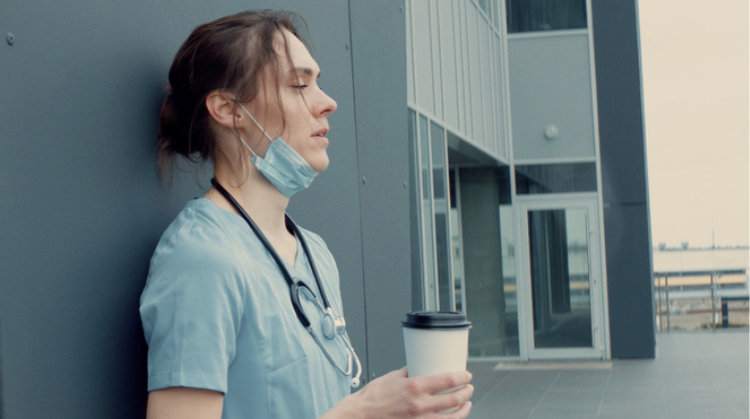Nurses, stress and COVID-19
 Dr Rebecca Garcia, Lecturer in Nursing at The Open University, reflects on the care of nursing staff during the pandemic, in this extract from her blog piece on BMJ Evidence Based Nursing.
Dr Rebecca Garcia, Lecturer in Nursing at The Open University, reflects on the care of nursing staff during the pandemic, in this extract from her blog piece on BMJ Evidence Based Nursing.
Coronavirus and COVID-19 has unexpectedly placed nurses on the centre stage of health care services across the globe; demanding that health services respond by realigning their provision to meet the demand of unusually high numbers of acutely ill, or worse, end-of-life patients. This has resulted in nurses being redeployed; oftentimes finding themselves in practice areas that were unfamiliar, or working directly with high risk patients in technically demanding and intensive environments. Furthermore, nurses may have been confronted with emotional challenges of caring for large numbers of dying patients, distraught families (sometimes aggressive), fears of becoming infected themselves, or infecting their own families (1).
Are interventions and support accessible and realistic?
Recognising the multidimensional causes of stress on nurses is essential in order to provide appropriate wellbeing interventions. The RCN (Royal College of Nursing), mental health charity MIND and the NHS have all developed resources to support mental wellbeing in practice during COVID-19, and include items such as risk assessments, and toolkits. Specific interventions might include one-to-one counselling, supervision, group-reflection and mindfulness activities.
But are such resources really accessible? Can nurses leave their work area, when they experience overwhelming emotions, or competing needs such as acutely ill patients and low staff numbers demand their focus remains on delivering patient centred care in that very moment? The World Health Organisation (WHO) (2020) has provided guidance to look after psychosocial health during the pandemic and considers specifically healthcare staff. However, the list of behaviours such as ‘avoid unhealthy food and alcohol’ and ‘ensure rest and respite between shifts’ are somewhat idealistic and fail to bridge the intention-behaviour gap (2). Afterall, nurses know they ought to eat well, sleep well and avoid alcohol, but overcoming habitual behaviour when feeling stressed is easier said, than done.
At the time of writing, COVID-19 appears to be here to stay for the foreseeable future. It is time we took our nurses wellbeing seriously and make a commitment to look after the very people who look after us in our hour of need.
Read the full article here. With thanks to BMJ Blogs for permission to reproduce this extract.
References
- Walford J. COVID-19: amid fear and anxiety, we must look after each other [Internet]. RCNi. 2020 [cited 2020 Sep 14]. Available from: https://rcni.com/nursing-standard/opinion/comment/covid-19-amid-fear-and-anxiety-we-must-look-after-each-other-159301
- Sheeran P, Webb TL. The Intention–Behavior Gap. Soc Personal Compass [Internet]. 2016;10(9):503–18. Available from: http://eprints.whiterose.ac.uk/107519/3/The Intention-Behavior Gap R1.pdf
Are you already an OU student?
Request your prospectus
Explore our qualifications and courses by requesting one of our prospectuses today.
Request prospectus